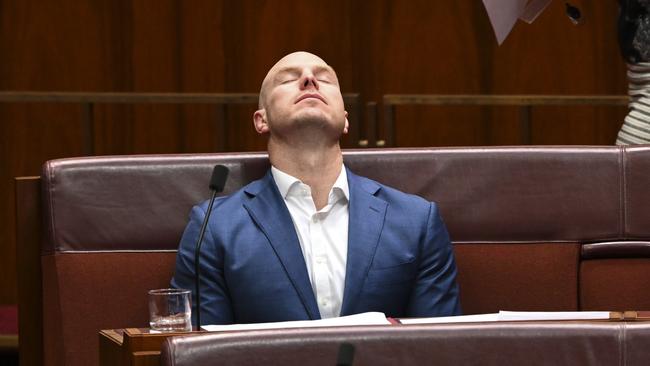Senate votes to split contentious workplace laws
The PM has been dealt a new blow on the government’s IR bill after Jacqui Lambie and David Pocock launched a bid to carve it into pieces.

The Senate has voted to split up controversial reforms to workplace laws, in an awkward blow to the government.
On Thursday, influential crossbench senators David Pocock and Jacqui Lambie brought on a vote to split off the non-contentious elements of the government’s proposed IR legislation.
Labor senators initially tried to block a vote on the legislation but it was overruled before ultimately allowing the changes to pass with no objections.
With the bills passed, they will now be brought on for a vote in the House of Representatives, forcing the government to either split up its omnibus bill or vote against elements of its own proposed legislation.
The four private senators bills stripped out the least controversial elements of Labor’s Closing Loopholes Bill in a bid to expedite new protections for emergency service workers who have been diagnosed with post-traumatic stress disorder.

The Senate also passed measures to stop discrimination against employees who have experienced domestic violence, changes to small business insolvency laws and to expand assistance for those who suffer from silicosis.
Senators Pocock and Lambie have justified the move on the grounds that the non-contentious changes must be implemented as soon as possible, while giving more time for controversial elements of the legislation to be debated and ultimately voted on in the new year.
Contentious changes being targeted include clamping down on labour hire, making it easier for casual workers to convert to permanent roles, and empowering the Fair Work Commission to introduce minimum pay and conditions for gig economy workers.
On Thursday morning, the move was met with fierce resistance from Labor senators who reiterated their call for the existing IR bill to be passed in its entirety.

Speaking to reporters in Canberra following the successful Senate vote, senators Lambie and Pocock implored the government to pass the four private senators bills, rather than use the omnibus bill to wedge the parliament into passing the legislation.
“For goodness sake, do the right thing and put them through. That’s what you should be doing. You should be leading by example,” Senator Lambie said.
“I said to the government from the start, please do not make this an omnibus bill. They‘ve decided to do that [with] 20 different schedules, four of them were uncontentious.”
Senator Pocock added that the government, by its own admission, had a “lot of work” to do before the bill could be passed.

“There’s a long way to run, and we’re looking forward to seeing amendments moved by the government and others in the house to clarify a whole range of issues that have been raised,” he said.
Peak workers’ organisation, the Australian Council of Trade Unions (ACTU), which wants the reforms passed in their entirety, said the crossbench had more than enough time to consult and should pass the legislation in full.
“There’s been a lot of time for consultation, a lot of time to scrutinise it. Now’s the time to pass it,” ACTU president Michele O’Niel told reporters in Canberra.
“We would urge everyone to support this bill because if you care about working people it's a simple choice.
“It’s a choice between working people and big business, whose side are you on?”

But business groups, which oppose many of the legislation’s contentious elements, welcomed the outcome.
Bran Black, head of the Business Council of Australia - which represents some of the biggest employers in the country including BHP and Qantas - said the government should vote to pass the non-contentious elements of the legislation in the lower house next week following the vote to split the bill in the Senate.
“If the government does not vote for their own policies it will be an acknowledgment of the significant risks of the entire omnibus bill to the economy and workers,” Mr Black said.
“The government’s proposals will impact every business in Australia and can’t be swept under the carpet without scrutiny.”
Australian Chamber of Commerce and Industry boss Andrew McKellar said the Senate vote provided the opportunity for a substantial rewrite of the controversial elements of the legislation.
“This allows the government to go back to the drawing board to fix its remaining misguided industrial relations changes.”


